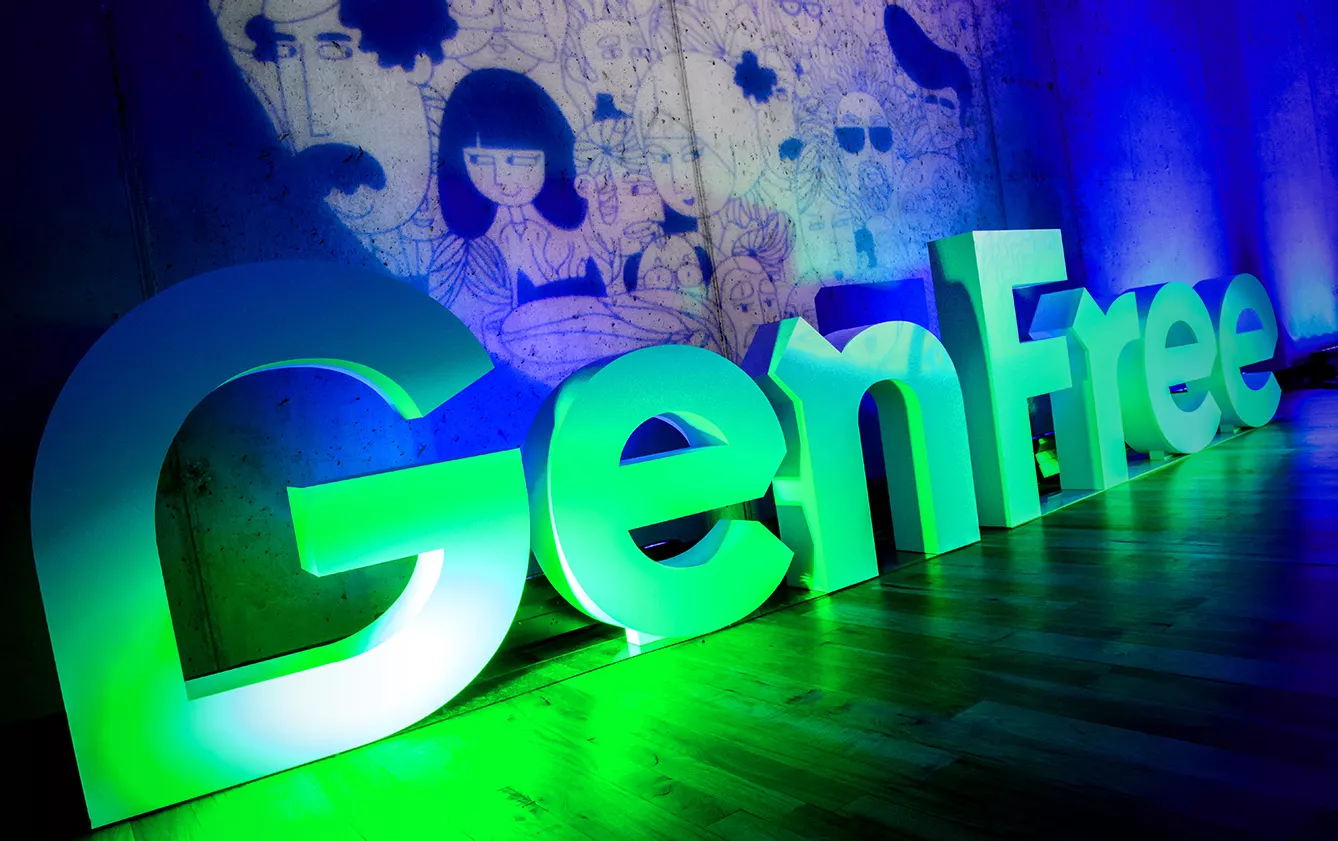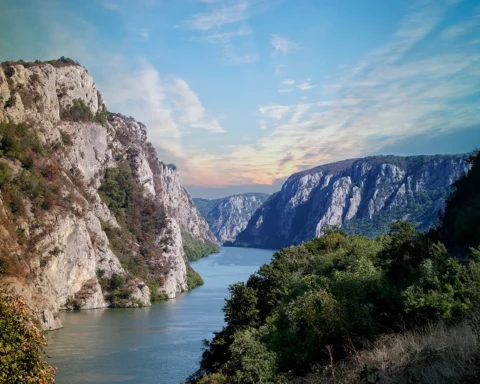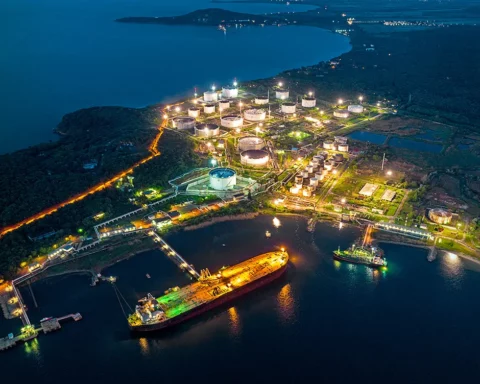Welcome to The Three Seas Generation Freedom Conference 2022, taking place in Poland’s capital city. The Conference has brought together recognized national and international experts, as well as our future leaders – socially and politically engaged youth from all of the countries taking part in the Three Seas Initiative. The first lectures, conducted in the TEDx format, are just beginning. Discussions ranging from the current geopolitical situation to freedom threatened by resurgent totalitarianism are likely to resonate around the world.
September 30th, 10:00 am
GenFree has officially kicked off
Hosts: Karolina Pajączkowska and Adam Starzynski
Karolina Pajączkowska and Adam Starzynski welcomed the guests at the second edition of the Generation Freedom conference 2022. The moderators emphasized how much has changed since the last edition. Rusian aggression on Ukraine shook the world. The Conference will bring us back to the 1990s, when freedom in the region was regained, and how it echoes in our reality today.
10:20 – Speaker: Mr. Paweł Nierada, First Vice President of the Management Board of BGK, Poland’s state development bank
Mr. Paweł Nierada, First Vice President of the Management Board of Poland’s state development bank, BGK, expressed his hope that the exchange and union of thought in the Three Seas Region will continue and contribute to shaping our future. He emphasized that this year’s edition shall focus on the issue of freedom, so hardly obtained and in need of constant care.
10:25 – Speaker: Mr. Włodzimierz Dola, Chairman of the State of Poland Foundation
Mr. Włodzimierz Dola, Chairman of the State of Poland Foundation, reminded the guests that the idea behind the Conference is to create a platform for young, bright people from the Three Seas Region to meet and share their thoughts on the challenges and possibilities ahead of the region. He hoped the platform would serve as a way for the region’s societies to understand each other better. This year, in the face of the Russian aggression on Ukraine, the decision was made to dedicate the Conference to the issue of regaining and cultivating freedom, inspired by the quote by pope John Pope II, who said that “Freedom is not given once and for all. It must be won time and time again with the help of truth.”
10:35 – Speaker: Mr. Paweł Jabłoński, Undersecretary of State for Economic and Development Cooperation, Africa and the Middle East
Mr. Paweł Jabłoński, Undersecretary of State for Economic and Development Cooperation, Africa and the Middle East, expressed his delight with the Conference. He emphasized that this meeting is taking place at a historical moment for Europe. Drawing on the Conference’s motto, the quote by Pope John Paul II reminded the guests that Ukraine is fighting for the freedom of Europe.
He expressed anticipation that this fact would be discussed throughout the day. He also pointed out that he believes the present situation in the region serves as proof that starting the Three Seas Initiative was a visionary move, as the countries began cooperation which will strengthen the region and help it stand up to contemporary challenges. He reminded the guests that Poland has been warning the world about the danger coming from the neo-imperialist tendencies of Russia, and he underlined that the Three Seas Initiative could help to change its influence.
He expressed his hope that together, the countries can help understand this danger and prevail against it, securing independence, as independence is the common goal of all the countries involved in the Initiative.
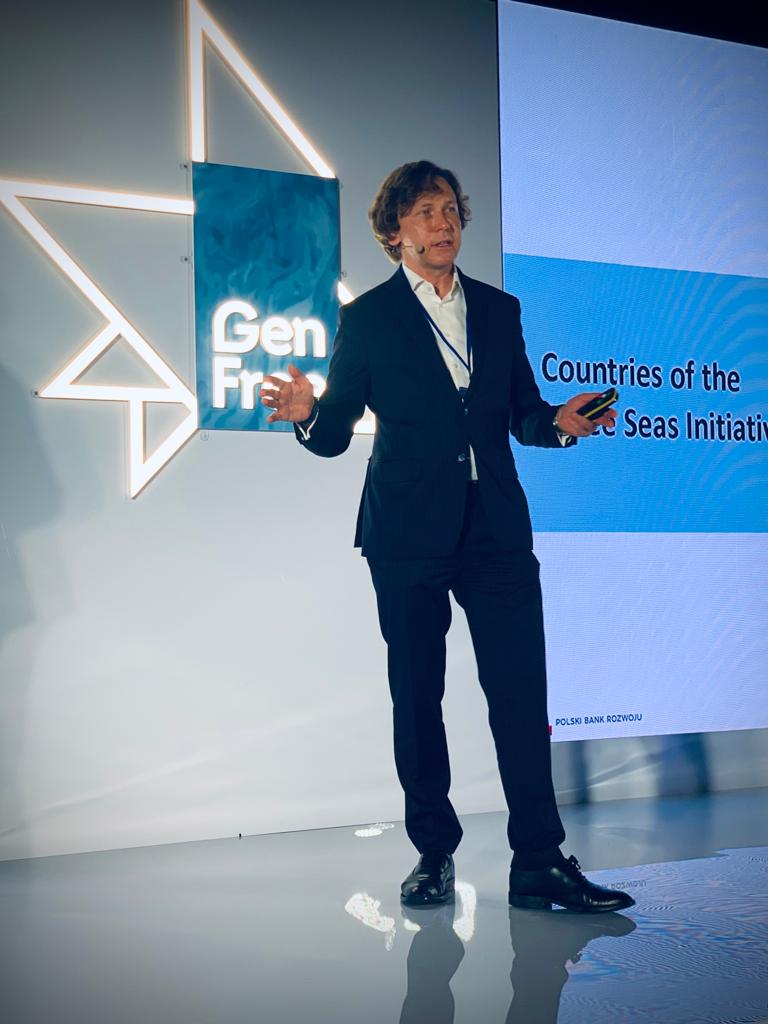
10:50 – Speaker: Mr. Paweł Nierada, First Vice President of the Management Board of BGK, Poland’s state development bank
Topic: Is Real Freedom Possible Without Economic Freedom? The Three Seas Case – Poland.
During his presentation, Mr. Paweł Nierada explained how economic freedom secures the independence of states. He said that when people can develop economically, they become more independent and successful, which allows them to involve in more activities that shape their future. Economically independent people can shape their lives as they please, which translates into politics and shaping democracy. He said, “if you are able to shape your future, you are becoming free.”
11:10 – Speaker: Yuri Felshtinsky, historian, prominent author, and journalist. He is an expert on Russia and the former Soviet Union and the co-author (together with Alexander Litvinenko) of “Blowing Up Russia.” an Expert on Russia and the former Soviet Union.
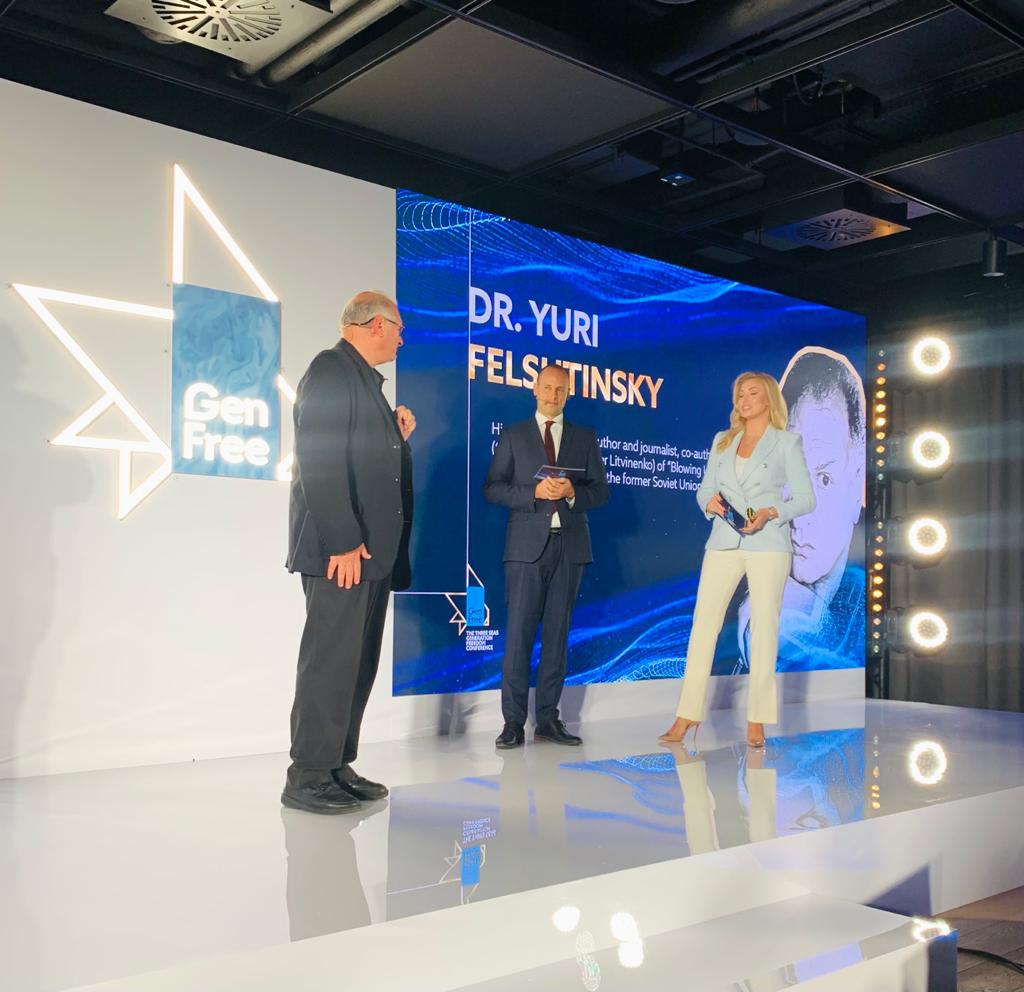
Topic: “Russia’s War in Europe. How Will It Proceed? How Will It End?”
Mr. Felshtinsky opened his presentation with the question: “What’s wrong with Russia?” His answer was, unfortunately, everything. He emphasized that Russia has never been a democracy and has always functioned only as an empire, which is vital to its understanding. The most recent Soviet Empire ceased in 1991, and the Russian people never experienced freedom. In addition, Russians were killed by their own brothers, and terror in the country was overwhelming.
His interesting insight into how Russia has developed since the Soviet Empire fell in 1991 illustrates how the KGB was always present around the active reformists in the early 1990s, including the current president, Vladimir Putin. He explained how KGB agents infiltrated all institutions over several years, leading to the forced resignation of the former president, Boris Yeltsin.
Mr. Felshtinsky pointed out that Yeltsin, upon his resignation, made Putin the Acting President of Russia without any elections. Several months later, he was proclaimed the lawful president through an elective process and immediately started introducing KGB agents into prominent positions. Such a situation had never occurred in the world’s history, as state security agencies would never be responsible for running the country. In today’s Russia, for the first time, we are witnessing a situation where the army acts as the state security body. We are now experiencing the transition of the dream of Russia to take influence over Europe and, indeed – over the world. We are witnessing an attempt at the resurrection of the Soviet Empire.
Mr. Felshtinsky drew the audience’s attention to the fact that Russia has essentially already taken over Belarus. He said we do not know what would have happened had Ukraine been taken in February, but he also stated that the worst is not over yet. Since Ukraine is not allowed to use the given weapons in an attack on the enemy forces, it is gravely restricted in its ability to push the Russian army out of Ukrainian lands effectively.
The conclusion of Mr. Felshtinsky was rather grim when he stated that he saw the potential of the conflict turning a bad turn and becoming the start of the Third World War. He did, however, leave some room for optimism, again reminding the guests that Ukrainians are fighting for the freedom of all nations. He underlined the importance of turning the world’s attention to Belarus in concentrating efforts on returning this country into European orbit. In the end, he said, he believed that the conflict would end with the collapse of Putin’s regime. However, there is no way of telling how long this process shall take and will be the final price to pay for this change.
11:45 – Speaker: Stanisław Żeryn, Secretary of State, Government Plenipotentiary for the Security of Information Space of the Republic of Poland
Topic: “Russian Disinformation as a Method of Russia’s Intelligence Activities.”
Mr. Stanisław Żaryn, the Secretary of State, Government Plenipotentiary for the Security of Information Space of the Republic of Poland, opened his presentation with the statement that Poland perceives the fight against fake news spread by Russia as a matter of national security and reiterated that “NATO views disinformation as the deliberate creation and dissemination of false and manipulated information with the intent to deceive and/or mislead.”
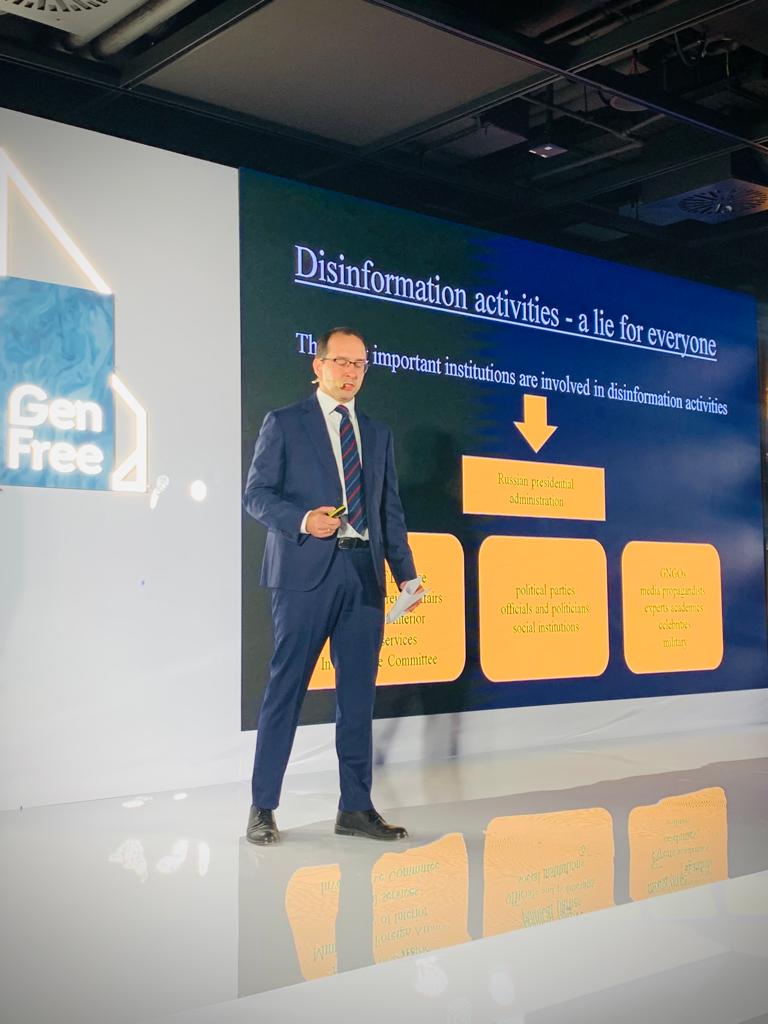
Similarly, information warfare is using media and human resources to persuade, paralyze, and overpower the perception of nations. He explained that the Kremlin sees such misinformation as a tool for maintaining the current power. Disinformation serves, therefore, as a method to attack the subjects perceived by Kremlin as enemies. He illustrated this claim with an example of Russia’s spending on propaganda in recent years.
He presented the narratives used by the workings of the Russian propaganda network against Poland. He reminded that those efforts started in 2014, during the first phase of the war against Ukraine, when Poland engaged in the situation, advocating for other nations to help Ukraine.
Mr. Żaryn pointed out that another breaking point took place in 2016 when a vital summit of NATO took place in Warsaw, and light troops were deployed on Polish soil. Russia immediately perceived is a threat and intensified its efforts to spread misinformation about Poland. Then in 2021, propaganda started attacking Poland in connection with the situation on the Polish-Belarussian border. It continued in 2022, after the aggression on Ukraine, due to Poland’s involvement in the efforts to support the Ukrainian nation.
He concluded that it is no coincidence that this misinformation takes place on Russia’s part. He claimed it is a systemic lie sanctioned by the state and part of a hybrid method of warfare. Therefore, it is crucial for national security to understand the aim of Russian propaganda and anticipate its next steps.
12:10 – Speaker: Tim Marshall, journalist, New York Times bestselling author of “Prisoners of Geography”
Topic: “The Distance of Freedom”
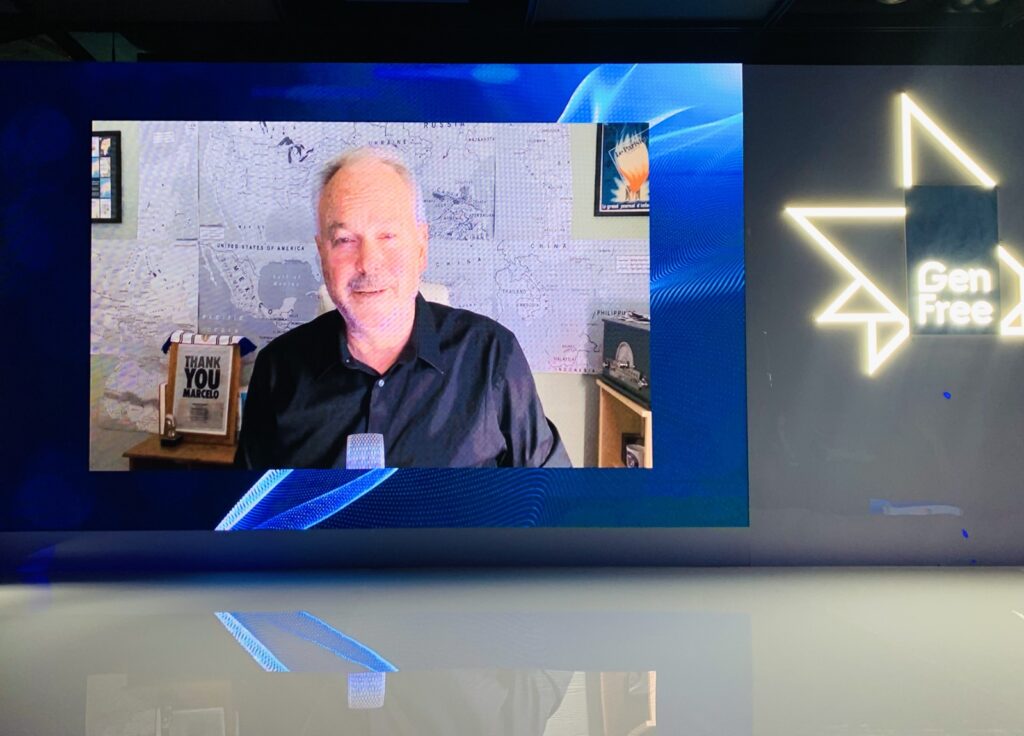
Mr. Tim Marshall opened his presentation with the remark that between 1989 and up until 2008, the world was bipolar – divided into American and Soviet influence. He claimed that we are returning to the bipolar state of the world now between China and America. However, at the moment, the world is struggling with multi-polarity. He remarked that, as in 1975, the world was wrong in claiming that the American influence was declining in power; it is similarly wrong about the decline of the American influence at present.
“The best case scenario is not a
– Tim Marshall, Journalist and
wholly defeated and humiliated Russia.”
NYT Bestselling author of “prisoners of geography”
He pointed out that last year, Americans left Afghanistan, and this year, Russia has been testing the position of America with its aggression on Ukraine. He remarked that people are entitled to freedom in democracy by choosing the governments they want and anticipating the changes they are likely to introduce. He mentioned the most recent development of the annexation of the Ukrainian lands declared by Russia today. He pointed out that the reason NATO missiles are not attacking Crimea is that there is still a dispute over whether Crimea is part of Russian territory. The question is whether the missiles should now be deployed against the lands Russia claims belong to them without aggravating the conflict.
He concluded that a possible ceasefire would resemble the one from 2014 when it was only a break before resuming the invasion. Mr. Marshall shared that a statement he believes to be very accurate is that “Everything is connected” and that it is a difficult argument for populations to admit that the current war in Ukraine concerns us all.
He expressed his view that the concept of the Three Seas gives security to the region and Poland and supports the idea of freedom. He said that if the countries involved in the Initiative thought together, it would give them a considerable advantage in overcoming challenges. He concluded with a quote from President Bush: “Those who seek missiles and terrible weapons are also familiar with the map of Europe. Like the threats of another era, this threat cannot be appeased or ignored. By being patient, relentless, and resolute, we will defeat the enemies of freedom.”
12:45 – Speaker: Julian Röpcke, a senior political editor at Germany’s best-selling newspaper, leading online news platform, and TV channel, BILD.
Topic: “Freedom Always Has a Price – But Are We Willing to Pay It? Germany’s Role in the Russian War in Ukraine Observed.”
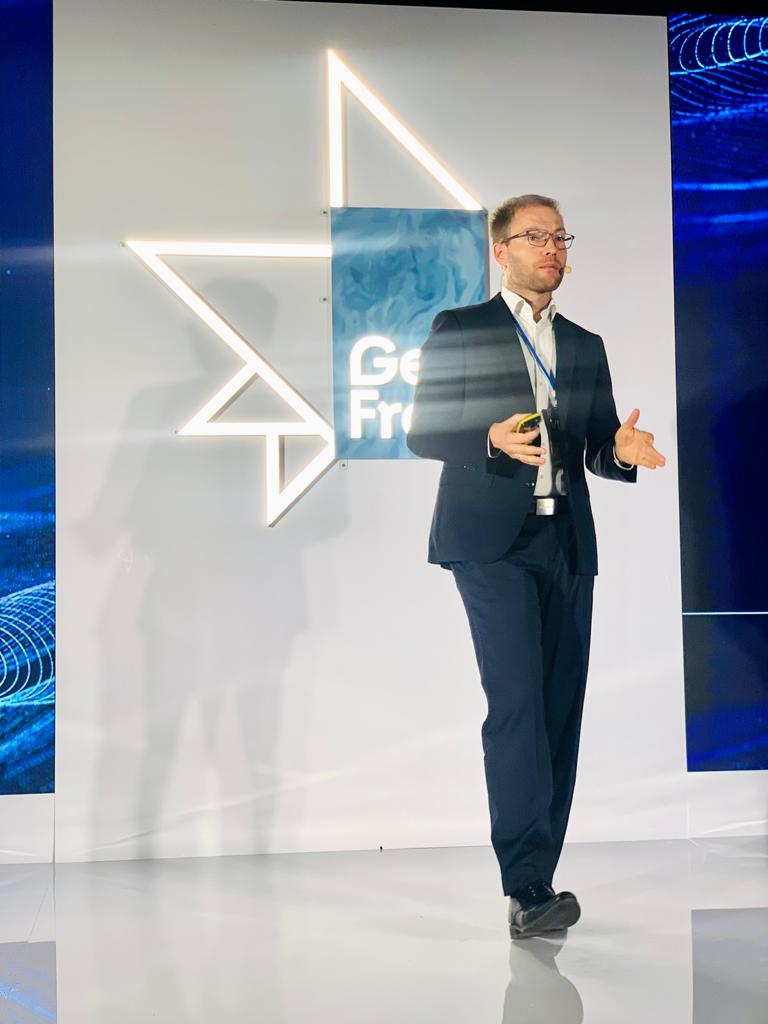
Mr. Julian Röpcke opened his speech by expressing the belief that Germany is no longer the same Germany we saw in January. He believes the friendship and closeness to Russia reached its breaking point. He explained that from the German point of view, the war was ‘impossible,’ and it took the Germans by surprise. It took the German parliament over a month to start the debate that perhaps the country should be more involved in sending armed help to Ukraine.
However, he urged to see above the criticism of German attitude towards the war and to understand the German perspective. He remarked that perhaps the German conviction that a military solution is not a viable solution, regardless of the reality around the globe, where wars are being fought, was the cause of its cautious response to the conflict in Syria and, now, in Ukraine. Germany wanted to believe the power of the dialogue would suffice, drawing heavily from the country’s historical experience. According to Mr. Röpcke, Germany always strives to stay in the middle, and the Russians were smart enough to exploit the German narrative.
13:25 – Congratulations to the participants and to the winner of the Generation Freedom Chess Tournament ♟?
- IM Jakub Pulpan ??
- GM Mateusz Bartel ??
- M Antoni Kozak ??
- Aleksandra Maltsevskaya ??
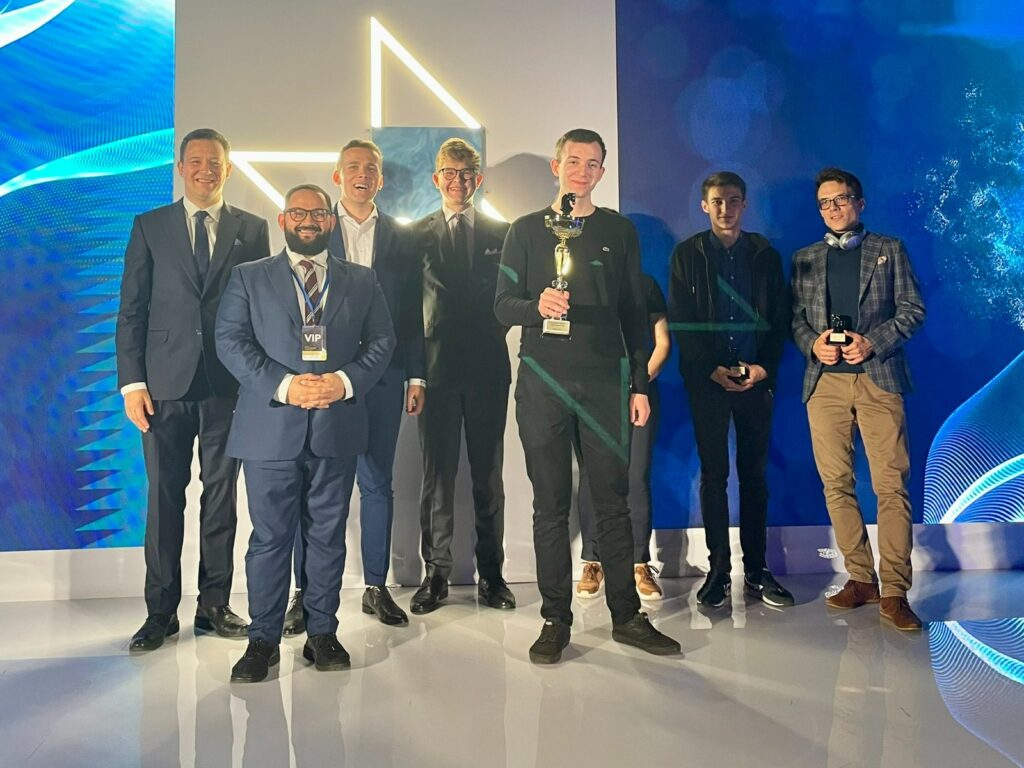
14:20 – Speaker: Edward Lucas, Senior Fellow at the Center for European Policy Analysis, former Senior Editor at The Economist, specialist in European and transatlantic security affairs
Topic: “Russia’s War in Ukraine. The Three Seas Challenge”
Edward Lucas expressed his gratitude to those who are keeping the Three Seas project alive, as he belies it is of vital importance. He said that the Western world assumed that Russia would emerge from the changes of the 1990s as another democratic country. He believes the West did not understand the mentality or the depth of the feeling in Russia towards the ingrained Russian sentiment of former glory.
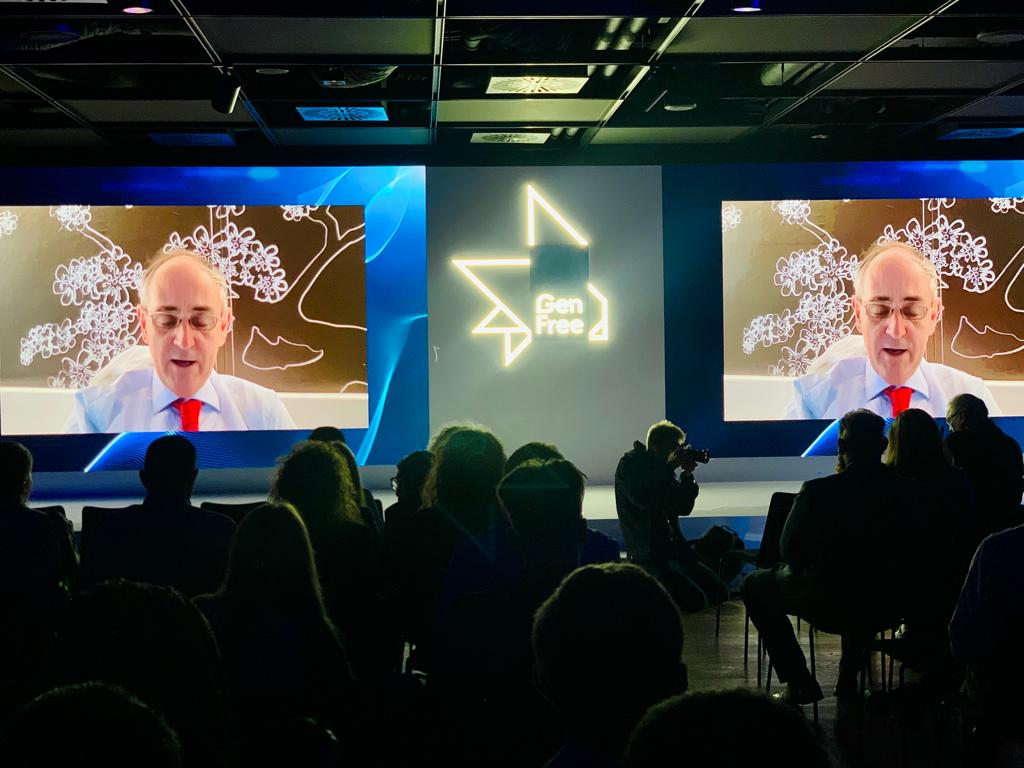
He also reiterated that problems with Russia predate Putin. He blamed the lack of understanding on the Western attitude and prejudiced perception of the countries which were on the other side of the former Iran Curtain. He admitted the West has ignored many wake-up calls and the among the consequences of that, tens of thousands of people lost their lives, and the economy suffered a great blow.
Mr. Lucas said he was overwhelmed by the support that the Baltic States and Poland showed Ukraine after the outbreak of the war. Especially given the fact that the relations between Poland and Ukraine have not always been historically great, notably during and post the Second World War. This demonstrates that cooperation is possible despite challenging unresolved issues.
“We must remember that freedom does not come free.”
– edward lucas, Senior Fellow at the Center for European Policy Analysis
He also pointed to the positive involvement of President Biden and his administration and their great support shown to Ukraine. However, this, in Mr. Lucas’s opinion, also brought to light the fact Europe is ‘bare’ without American help. Therefore, he called for Europe to wake up in terms of European defense and called on Europe to begin building European strength that would be independent of America, which is facing its own issues. Mr. Lucas said, “We must remember that freedom does not come free.”
He also expressed his belief that the current situation is a “dress rehearsal” for what the West and Europe are going to face from China. He said there is a need to think strategically about the relationship with China, especially with regard to imports and exports. ‘It is a profound call,’ he said when discussing the issue.
He also expressed his shock that the War on Ukraine has not been condemned throughout Africa and South America. He said he believed that if Europe is to win this strategic battle, it needs to pay attention to this side of the issue. He believes that the ‘Global North’ and America should try to rebuild the connections with Africa and South America and help them understand the importance of fighting the Russian and Chinese imperialist tendencies. He concluded by emphasizing how important it is to support Ukraine in its current fight for the benefit of us all.
14:55 – Speaker: Professor Nikolai Ivanov, history professor and former editor and broadcaster of Radio Free Europe
Topic: “Russkij Mir – The Russian World”
Professor Nikolai Ivanov opened his presentation by saying it is a great mistake to think Russia wants to bring back the Soviet Union while, in fact, Russia is trying to implement a wholly new ideology – the ideology of the “Russian World.” He explained that this ideology was first formed in the 1990s, but the idea behind it is much older and reaches the times prior to the great revolution. He reminded the guests that ideology in Russia was polarized between those who wanted Russia to be more like the Western countries and those who wanted to draw from the Russian revolutionist ideology. We are witnessing the defeat of the former group and the victory of the latter.
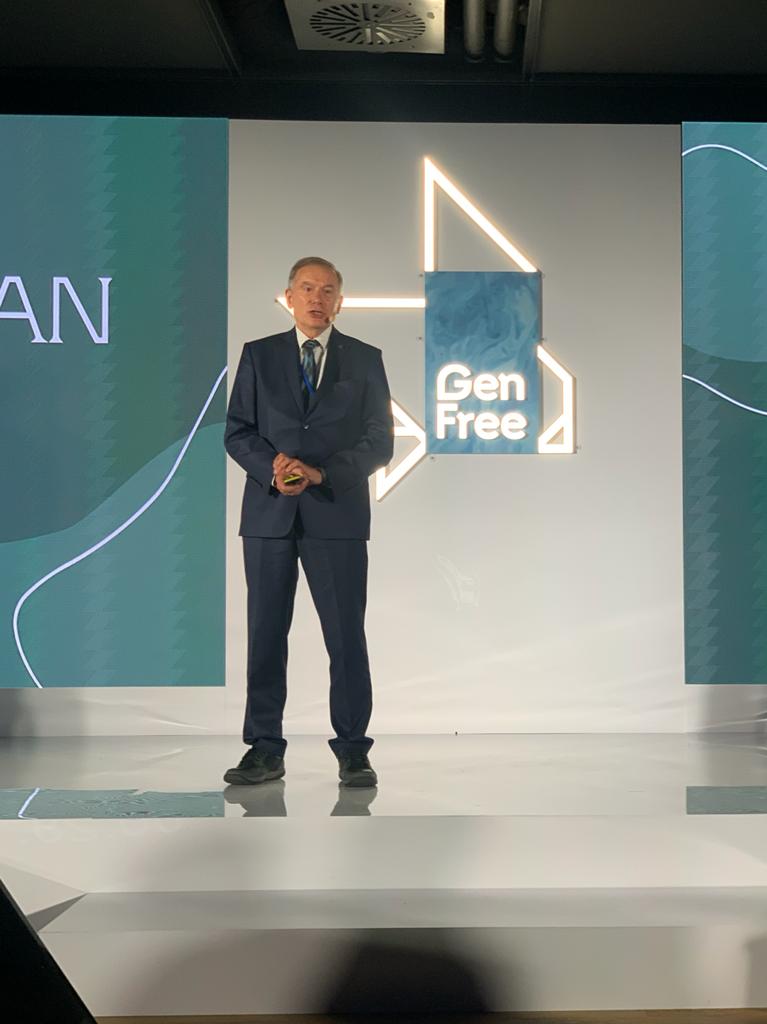
He remarked that those in favor of the Bolshevik ideology would also say they were trying to Westernize the country, using Lenin and his 20 years of living abroad as evidence to that end. However, these days it is Russian nationalism that prevails in the Russian public domain. He reminded the audience that Stalin once said that “real communism has no nationality.”
He drew attention to the fact that many groups were being repressed in Russia during Stalinist times and that many were banished from the Soviet Union. He remarked that this process could also be perceived as one of the effects of the “Russian World” ideology. Professor Ivanov named Aleksander Dugin, a Moscow professor of political science, as its main author. He explained that this ideology revolves around the idea that the Russian ethos is “the most important European ethos,” and that it should serve as the basis to restore the Eurasian empire, where the “Anglo-Saxon” world is represented by the United States of America. This, Professor Ivanov emphasized, is the Kremlin’s official ideology at this time.
He also remarked that the theories of Alexander Solzenicyn are also important to the current President of Russia, Vladimir Putin. Therefore, Ivanov suggested that one of the reasons behind the aggression on Russia could be seen in the high Russian population living in Ukraine, especially in the East. Also, Ukraine could potentially be one of the richest countries in Europe. He urged the audience to imagine what could happen if Ukraine were left to develop freely and prosper without the destruction brought upon it by Putin. He left the audience with the following question: should we consider the “Russian World” ideology to be racist or criminal?
15:25 – Speaker: Velina Tchakarova, Director of the Austrian Institute for European and Security Policy (AIES)
Topic: “The Geopolitics of the Three Seas Initiative Amid Bifurcation of the Global System”
Velina Tchakarova spoke about the geopolitics of the Three Seas Initiative amid the bifurcation of the Global System. She remarked we live in a period of profound geopolitical changes, suggesting we may perceive it as the new version of the Cold War. Tchakarova pointed out that the fall of the Soviet system in December 1991 left the world almost entirely following the capitalist system for the first time in history.
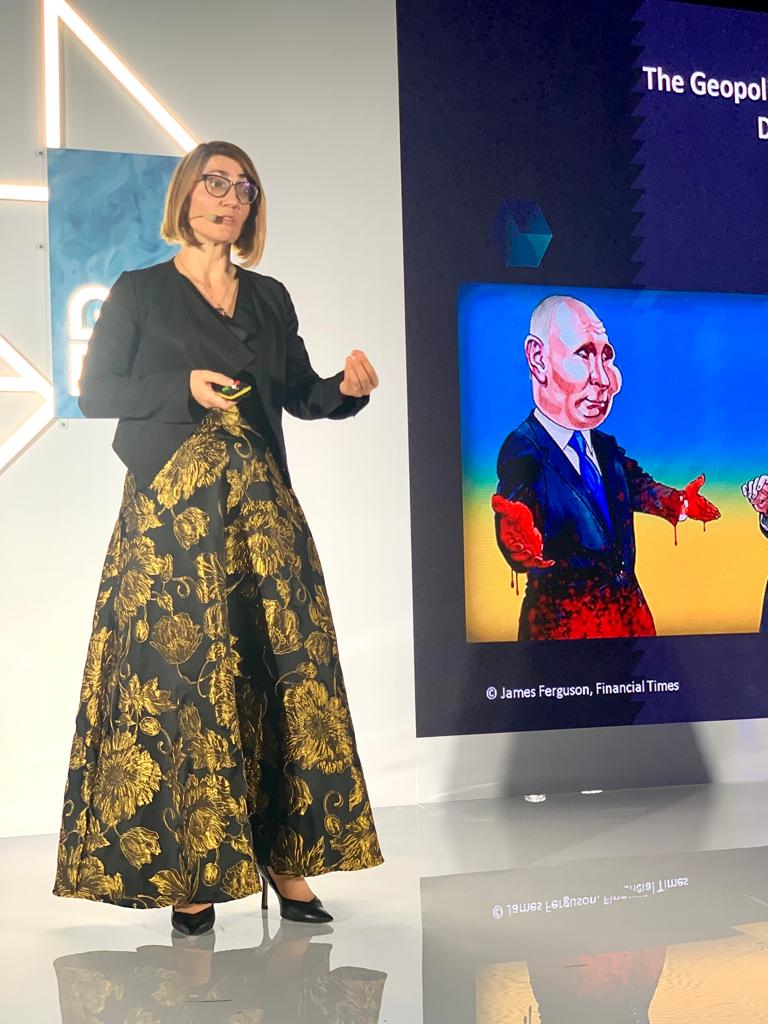
She pointed to the increasing tension between two Eastern giants – China and India, which is rapidly growing and emerging as the third giant of the East. In this, she explained she sees the possibility that the USA may withdraw from the old continent as it faces more challenges posed by China. Ms. Tchakarova said that “Amid these systemic shifts we are entering a transitional period in International relations, and it points to bifurcation that means the system is splitting into two major parts: the formation of two centers of power – one in the USA and the other one in China.”
Ms. Tchakarova pointed out that the outcome of that process is of vital importance to the Three Seas Region, as it will establish the ‘new rules of the game.’ She reminded the audience that the previous victor of the Cold War was able to establish most of the global norms and rules. This is relevant, as she believes Russia would not wage war on Ukraine were it not supported by China.
“The geopolitics of the TSI offers an answer to current problems and challenges and is preparing us for future challenges, especially regarding the support for Ukraine,” Tchakarova said. She mentioned, amongst others, that she believes “it would be essential to include Ukraine into the Three Seas Initiative, as well as support its EU member status community.”
She concluded by saying that “CEE has suffered far too long from its satellite role within the Soviet Union during the Cold War.” She argued that the liberal order is challenged by a new competitor – China – that is amplified by Russia. She said she believed the “Three Seas Initiative must become one of the leading geopolitical projects in Europe, contributing to strengthening of democracy and liberal order in the old continent as a counterweight to Russia and China.”
15:50 – Speaker: Marko Mikhelson, Estonian MP and Chairman of the Foreign Affairs Committee of the Estonian Parliament
Topic: My Personal Journey to Understanding What freedom Is: Why We Have a Sharp Sense of Freedom in Estonia and How it Helped Us to Become Who We Are
Marko Mihkelson started a very personal presentation on his journey to understanding freedom. He remembered how as a young boy, 11 years of age, he was asked by his teacher who he wanted to be in the future. He said he was sure he wanted to be a historian. Under the Soviet occupation, the history of Estonia was not spoken of and hushed in fear of consequences that could follow.
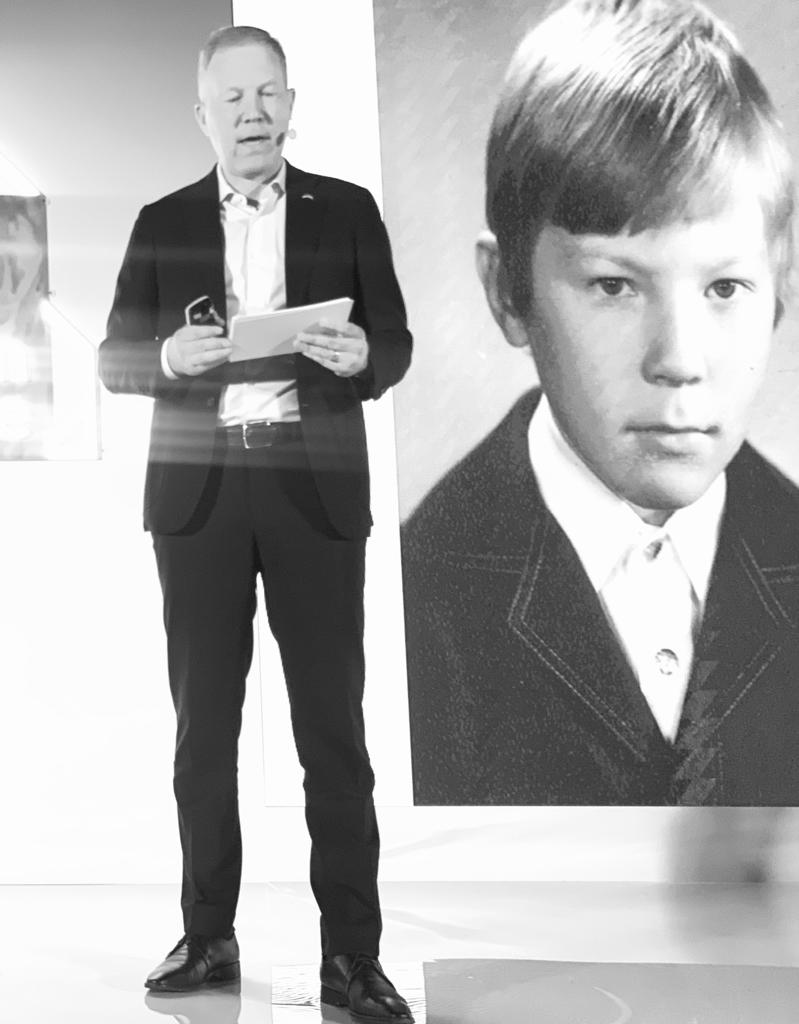
Seven years later, he was allowed to cross the border to Berlin for the first time in his life. He confessed it felt like leaving prison for the first time in his life. He was told Poland was a dangerous place but remarked that, at that time, he did not entirely understand what was going on. Only later, when the regime started falling in the East, he said he was beginning to understand that Estonia was much more than just a place to live. The nation was starting to raise and hold its head up high.
In 1989, Estonia’s Independence Day was celebrated nationally for the first time. Mihkelson, as a member of a community cultivating the history of Estonia, was chosen as one of the bearers of the Estonian flag. He shared with the audience that this moment was bigger to a young person than words can describe. “It was a miracle,” he said.
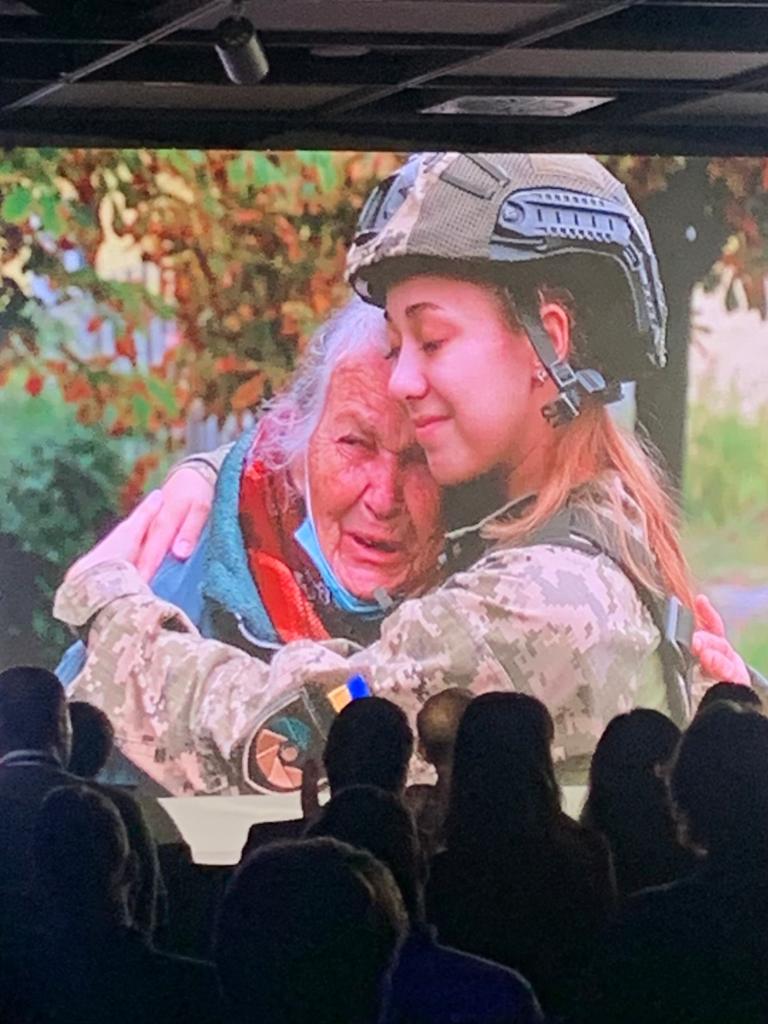
He said that during his studies of the history of the Bolshevik repressions of the Estonian people. He was the first to access documentation proving those terrible crimes and manslaughter committed by the Russians. This experience led him to start his professional career as a journalist for one of the biggest Estonian newspapers. He became a foreign correspondent in Moscow. In October 1993, he witnessed demonstrations of the local people, which, he said, made him worried for the first time about the future of democracy in Russia.
He spoke about how he witnessed the state slowly turning back toward terror in order to fulfill its political goals. Mihkelson was later chosen as an MP during the 2003 elections. He remembered how Kyiv was fighting for Ukrainian Independence in 2013. He said he asked the protesters what they were fighting for. The answer he received was short and simple: “we want to be free and decide about ourselves just as you, Estonians, can.”
During a Q&A session, he concluded that a lesson to be learned from Estonian history is that smaller countries should never give up and dream big.
16:10 – Speaker: Anton Gerashchenko, Councillor of Ukraine’s Minister of Internal Affairs
Topic: “Why Has Russia Already Lost the War to Ukraine?”
Anton Gerashchenko, in his presentation, attempted to answer the question, “Why has Russia already lost the War to Ukraine?” He said that this defeat did not happen today or yesterday, but with the moment his army entered Ukraine in February. He wanted to go down in history as the President who conquered Kyiv. But this fell through.
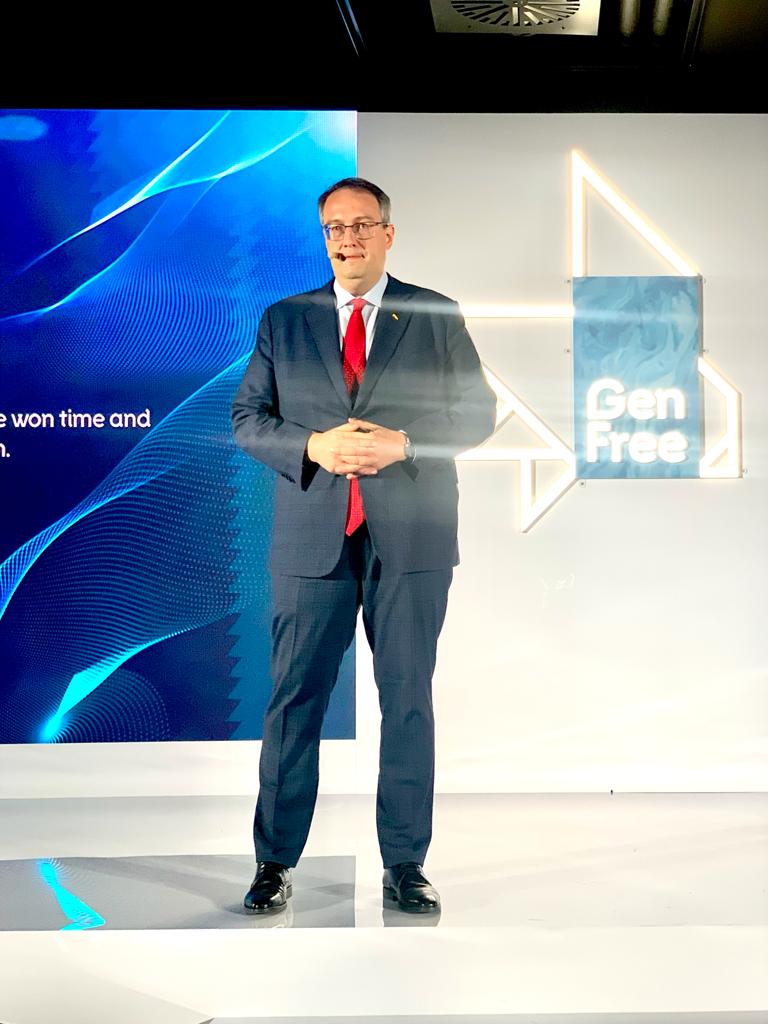
He said that people win when the truth is on their side. “And the truth is on the side of Ukraine,” Gerashchenko said. “And the strength,” he expressed, “flows from the help of countries such as Poland, and indeed from further areas of the globe.” He pointed out that the second army in the world could not defeat the Ukrainian defense. And now, in Mr. Gerashchenko’s view, Putin is losing his power when his narration is falling apart in front of his own eyes.
Mr. Gerashchenko said that Russia should receive the same treatment as North Korea. He claimed the current sanctions are insufficient. He pointed out that the conflict is still escalating and that the need for weapons and help is still vast. He said that even Russians, who believed in the wisdom of Putin, have realized that he is leading their nation to destruction, which can be seen by the manifestations now taking place in Russia.
He concluded by exclaiming, “Glory to Ukraine! Glory to the Ukrainian forces!”
During the Q&A session, he expressed his view that the best solution would be to accept Ukraine into NATO. Such action, he believes, would show that no civilized country will ever accept Russian aggression on any sovereign state.
Mr. Gerashchenko also pointed out that he believes that propaganda is the most destructive weapon used by Russia in this war. “While weapons can kill thousands – propaganda can kill millions,” Mr. Gerashchenko said. He also assured that with constant help from the West, Ukraine shall win the war against Russia.
16:50 – Panel Discussion on “The Media’s Role During National Struggles for Freedom” featuring:
- Tadeusz Giczan – Journalist and former Editor-in-Chief of the Belarusian opposition media service, Nexta. Non-resident fellow at CEPA.
- Jan Macháček, Czech columnist for Lidové Noviny and Chairman of the Board of Trustees of the Institute for Politics and Society in the Czechia. Dissident before 1989 and a signatory of Charta 77.
- Iuliia Mendel, Ukrainian journalist and political advisor who served as President Zelensky’s press secretary between 2019 and 2021.
Ms. Iuliia Mendel, Mr. Tadeusz Giczan, and Mr. Jan Macháček were the panelists in the discussion panel on the media’s role during national struggles for freedom. Ms. Mendel said that Ukraine was more prepared for the information war with Russia following the events of 2013, when Russia was forming accusations against Ukraine, labeling Ukraine as a fascist state. “Thankfully,” she said, “Ukraine managed to build a good image of its country in the international arena. An image that shows we are different in our values. And we are speaking the truth.”
Mr. Giczan recalled the statement made earlier in the day by Mr. Gerashchenko, who said that “propaganda is the most destructive weapon used by Russia in this war.” He said that repressions in his country, Belarus, mean that half of his journalist friends are now in jail serving 20-year sentences. He claimed that currently, Belarusans want to free their country from propaganda. He reminded the guests that many Belarusans joined Ukrainian forces in the struggle against the Russian army.
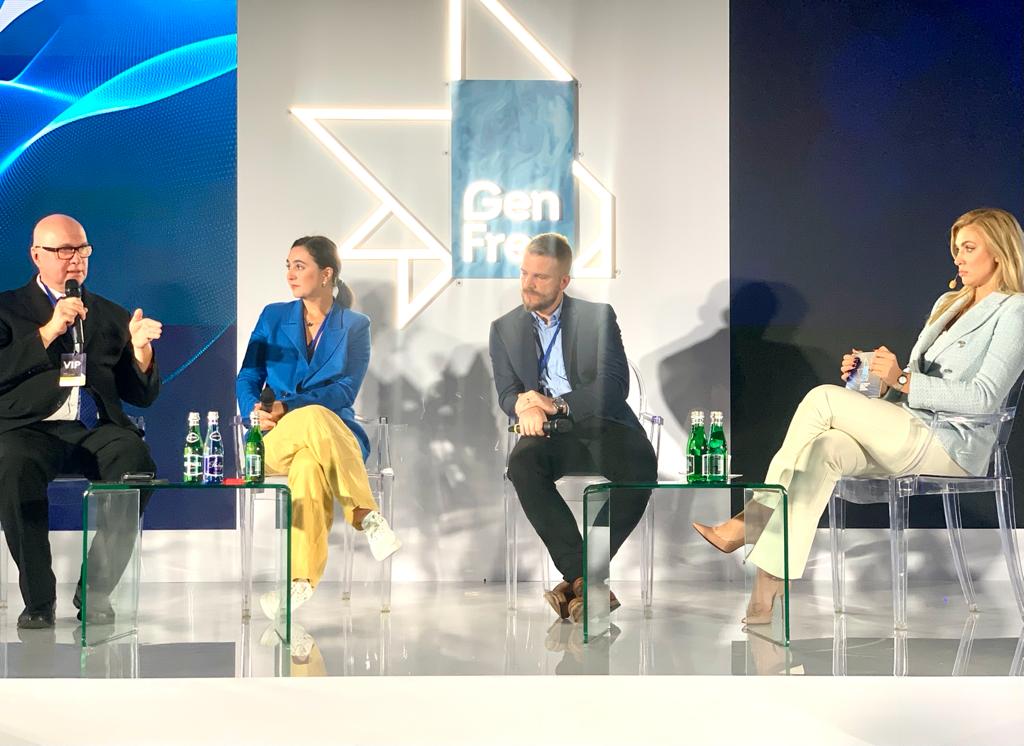
Mr. Macháček, an underground journalist during the 1980s, referring to what was said by Mr. Giczan, said he deeply admired Belarusan journalists in their current struggle and believed the consequences he faced were incomparable to what is happening currently in Belarus and Russia. He said he thought that it is important to remember that, in a way, we are at war, and in a way – we aren’t. He advised we should be careful as in every war, propaganda is present on both sides, and “journalists should always be able to ask critical questions and not get involved in propaganda.” He said he believed that in a democracy that is not in a state of war, people should be free to express themselves and allowed to disagree with each other’s opinions. He said he believed it “is crucial” for discussion to be present in free media.
Ms. Mendel remarked that dictators hit the media first to destroy democracy. She said she believed the role of media should be that of a healthy approach and act responsibly. The moderator pointed to President Zelensky’s role in convincing the world of Ukraine to win this war, and she asked how much his choice to be present in the media helped to achieve this. Ms. Mendel replied that she was happy when the Ukrainian President decided, against his advisors, to be present in the media as this is how freedom and democracy are built.
She also stressed that there was no time for him to create his media persona – he just spoke to the nation as he was, in the conditions he lived in. He spoke the truth and called for unity, and people know that his contribution can not be overstated. She spoke of how she witnessed a situation when Mr. Zelensky decided to stay with his soldiers during the shelling in Donbas, and she expressed her gratitude that Ukraine has such a fearless leader at such a difficult time.
Mr. Giczan, when asked how he sees the future of the free media channels in Belarus, answered that the future of the entire region depends on the outcome of the war in Ukraine. He expressed his gratitude for the efforts made by the Ukrainians and asked them to continue defending the region’s future.
17:25 – Panel Discussion on “The case of energy security in Poland” featuring:
- Marcin Chruściel – President of The Institute of New Europe
- Wojciech Jakóbik – Editor in Chief, Biznesalert.pl
- Wojciech Jasiński – Academy of European Careers – Energy and Climate Expert
- Petros Tovmasyan – Key Expert, New Europe Foundation
Mr. Marcin Chruściel, Mr. Wojciech Jakóbik, Mr. Wojciech Jasiński, and Mr. Petros Tovmasyan were the panelists in the discussion panel on energy security in Poland.
Asked about the Nord Stream scenario and the survival of Europe without it, Mr. Jakóbik said there is no way to predict the future at the moment, and it is necessary to prepare for every case scenario. He pointed out that the economic crisis will soon hit and that he believes that the Kremlin’s hope is that this economic backlash will hit Europe so hard that the governments will fall and new ones will support Putin’s policies. He reminded the guests that the old Soviet strategy was saying that an energy crisis should be started to prevent the expansion of NATO, which is what we are seeing happening now.
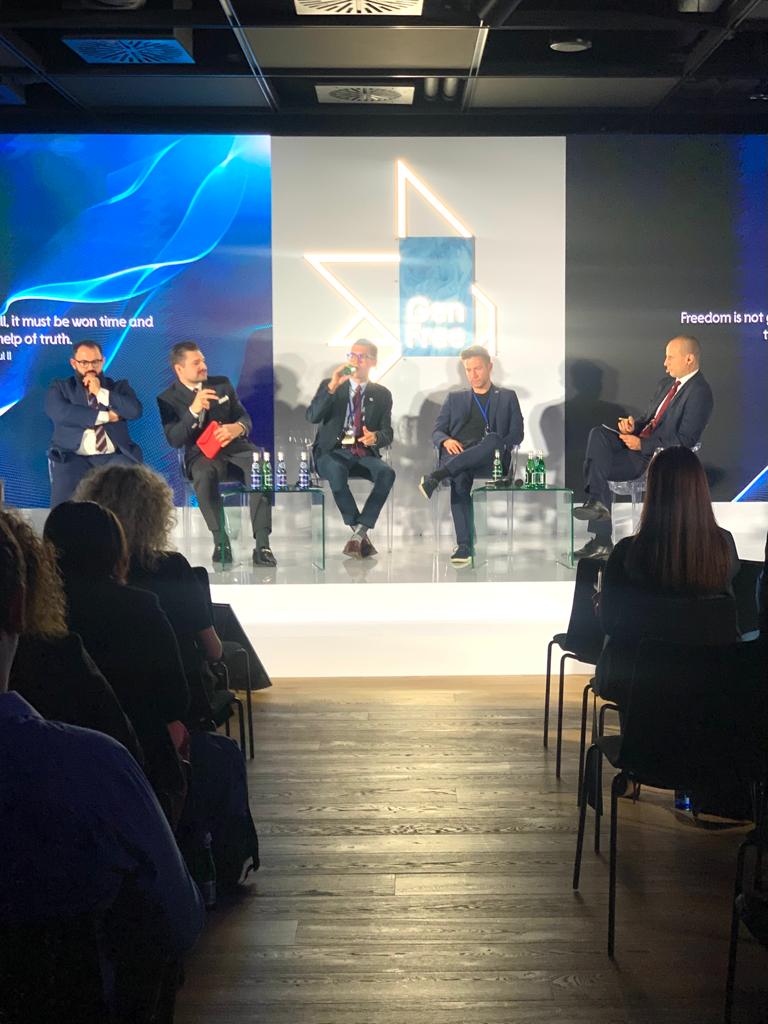
Mr. Jakóbik, commenting on the Baltic Pipe, said it was a crucial investment as it provides an alternative gas supply to our region. It will, at the moment, satisfy half of the demand for gas in Poland. But in the future, this investment could send gas into other regions of Europe and be re-exported by Poland. He said that this investment is vital and that it is crucial to use the windows of opportunities that present themselves to the countries of the Three Seas Region.
Regarding nuclear power, Mr. Chruściel said that our strategic security would obviously increase after constructing a nuclear plant. He pointed out that nuclear energy is considered a green energy source which additionally works in Poland’s favor. He believes the construction of such a plant is a step in the right direction. He expressed hope that such a strategic solution would also aid Poland in its current disputes with the European Union on the grounds of energy.
Mr. Jakóbik added that he is hopeful that finally, after thirty years, a positive decision to construct such a facility will be made this October. Mr. Chruściel said that the small modular reactors, in his opinion, would not be able to provide enough energy for the entire country. Still, he believes that we should be paying attention to the energy mix at a 6 to 9 ratio.
Mr. Jasiński, replying to the question regarding the halt on the European green policies, said there was a narration that coal was the worst source of energy, according to the EU, but he said he believed this is such a complex system that putting the issue in such terms is unfair. He said he believes it is perfectly ok to use renewable energy sources, but there is nothing wrong with using coal. Especially, as coal could provide at least a partial answer to the current crisis.
Nevertheless, he emphasized that renewables are “free of charge,” which plays to their undeniable advantage. He remarked that the problem with climate change is broader than just the greenhouse effect. He pointed to the health conditions relating to the degradation of the natural environment. With regards to energy security, he remarked that a country is secure when the cost of producing energy is acceptable, a country is free to use it, and when its production is stable and reliable. Hence renewables constitute a safe energy source.
He also pointed to the example of China, which is the country with the fastest growing country in the renewable energy sources sector, and that this is happening without the involvement of any authorities that would be pressing China to invest in such sources. He sees that as evidence that the choice of such sources is simply a smart move for any country.
Mr. Tovmasyan said that the problem with energy is not the problem with it as such, but it is a problem that concerns us – the people. He said should people be prepared to live in colder conditions during the winter and own fewer phones and appliances, then the problem with energy would disappear. He emphasized that the problem is, in fact, that people use a lot of things and they are not prepared to resign from them. He suggested that should people decrease their expectations of what is “normal energy consumption,” it would change the global energy situation. He also pointed to the fact that other countries own natural resources such as gas, for example, Iran, Belgium, Poland, and the Netherlands, so why not use it?
He expressed his disbelief that despite many voices warning that Russia is an unreliable partner, Western countries did not turn to these alternative sources some 15 years ago. He remarked that the reluctance to use Iranian gas due to its “totalitarian system” looks rather ironic in light of the recent actions of Russia. He also expressed his belief that doing business with totalitarian countries, as per the example of Iran, also has an additional effect – it often changes the reality of these countries for the better.
18:00 – This discussion concluded the second Generation Freedom Conference. The moderators thanked all the guests and expressed their hope that we shall remain united in the coming year and meet again in 2023.


